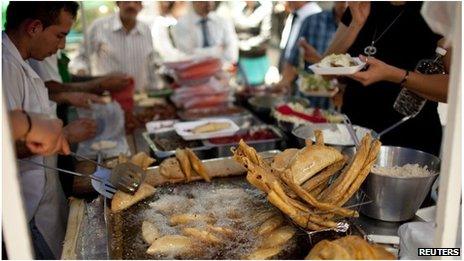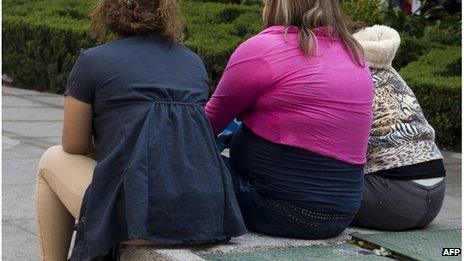Mexico passes 'junk food tax' reform
- Published

Mexican authorities are trying to curb the consumption of unhealthy food
The Mexican Congress has approved a tax reform bill imposing new levies on junk food and soft drinks.
President Enrique Pena Nieto's project also aims to boost government revenue by increasing top earners' income tax.
The government says the extra cash will go on infrastructure and social security, but critics say it will hurt Mexico's sluggish growth.
Mexico recently surpassed the United States as the country with one of the highest obesity rates in the world.
A recent report by the United Nation's Food and Agriculture Organization (FAO) says that 32.8% of adult Mexicans are obese, compared to 31.8% of Americans.
The country's health authorities say there are more than five million obese children in the country and a 9.2% incidence of diabetes among children.
"Obesity and diabetes are affecting school and work performances, and with it, the country's economic competitiveness," Mexico's Health Minister, Mercedes Juan, told reporters on Thursday, at the launch of a country strategy to tackle the problem.
Long debate
It involves a big push to label unhealthy food, restrict advertisements to protect children and boost physical exercise in schools and workplaces.
The Senate approved the tax reform after more than eight hours of debate, proposing amendments that require another vote by the lower house.
After the Congress' final approval, it now needs to be sanctioned by President Pena Nieto.
The law imposes a levy of 8% on junk food, after the Senate increased it from the 5% originally proposed; and creates a tax of one peso ($0.07; £0.04) on every litre of soft or sugary drinks.

The new anti-obesity strategy aims to boost exercise in schools and workplaces
The income tax rate for those earning more than 750,000 pesos ($57,000; £36,000) is to go up as high as 35%.
The legislators also passed a controversial hike in value added tax (VAT) for border regions, from 11% to 16%.
Critics say the actual boost in tax revenue will be small.
The original government's proposal aimed at raising an additional 2.7% of tax revenue until 2018.
But after the changes passed by the Congress, the package is expected to bring in less than that.
The tax hike is part of wide-ranging structural reforms proposed by the Pact for Mexico alliance, led by the president.
The broad alliance has already passed a telecommunications reform.
- Published16 August 2011
- Published6 August 2013
- Published26 October 2013